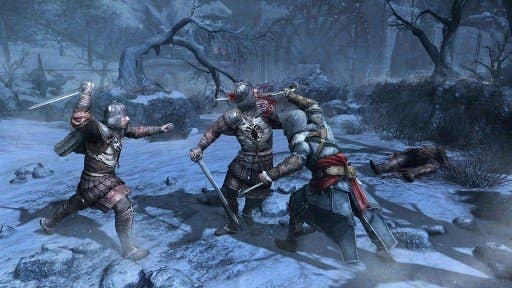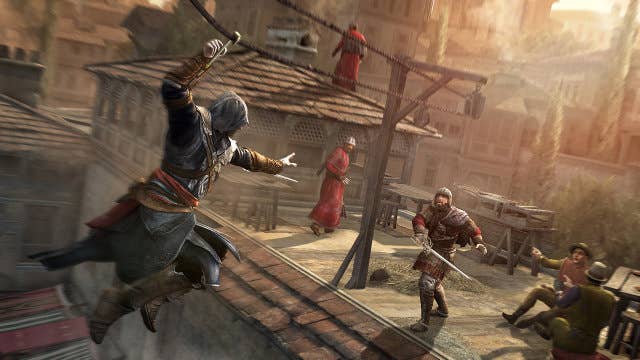Critical Consensus: Assassin's Creed: Revelations
Ubisoft's core franchise, like its protagonist, begins to show its age
In a year defined by trilogies drawing to a close, Assassin's Creed: Revelations feels like a fortuitous accident. Uncharted, Saints Row, Modern Warfare and Resistance didn't hide from their three-ness; the number, or some derivation of it, was right there on the box next to the title. However, like its nimble protagonists, Revelations has concluded its trilogy by stealth.
Ubisoft wants us to think Assassin's Creed III is still to come. But if that's the case, what does that make Revelations? Assassin's Creed II: The Third?
The last game in the series, Brotherhood - a.k.a. Assassin's Creed II: The Second - was one of the great surprises of last year, building on the leaps and bounds made by its predecessor to silence the critics poised to take it down for being a cynical sham. You could be forgiven for being among the haters; after all, Brotherhood was developed in a year, and it was difficult to imagine how significant improvements could be made in such a small amount of time.
The fact that Ubisoft pulled it off was both impressive and troubling. Certainly, Brotherhood made all the right moves, but critics were loathe to accept that mega-teams and stacks of cash could be substituted for time to think and refine. With Revelations, however, the cracks are beginning to show.
For Giant Bomb's Ryan Davis, this is most apparent in the story. "The name alone, suggests a certain amount of closure," he writes in his four-star review, "but the greater Assassin's Creed story feels like it's starting to spin its wheels."
The majority of Ubisoft's marketing for the game has featured Ezio Auditore and Altair ibn-La'Ahad, a tacit promise that Revelations would unite the largely separate journeys of its twin protagonists. According to Davis, though, this is very much Ezio's story, with both Altair and their present-day descendant Desmond Miles relegated to largely perfunctory interludes.

"Unlike Ezio, who has the full run of Constantinople, the episodes where you play as Altaïr are highly constrained, taking place almost exclusively in and around the guild castle at Masyaf from the first Assassin's Creed."
"These sequences aren't much to play, and though they provide some insight into snippets of Altaïr's life after the events of Assassin's Creed, their implications for the fiction at large seem limited. Yes, we know more about Altaïr's family and his turbulent relationship with his guild, but it all goes by so quickly that it's hard to get terribly invested."
"Generally speaking, Revelations is more interested in filling in back story than it is in maintaining forward momentum. There is an ironic paucity of revelations in Revelations."
Revelations may not move the plot along in the way followers of the lore might have hoped, but Davis concedes that the simple pleasure of traversing the city and killing your mark is as beguiling as ever. The Guardian's Nick Cowen echoes these sentiments in his review - also four-stars - which claims that the new setting of Constantinople holds its own against the ravishing Renaissance playgrounds of the two previous games.
"The streets buzz with market sellers, town criers and guard squadrons who patrol the cobbles. Head up above street-level and majestic spires and sun-kissed domes jut out against the undulating concrete rooftops... It almost goes without saying, because this is an Assassin's Creed game, that everything looks historically accurate and absolutely gorgeous to boot."
Assassin's Creed: Revelations is everything Assassin's Creed has ever been, and less
John Teti, Eurogamer
And moving across the city is now more enjoyable than ever. Of course, Ubisoft could change practically nothing and traversal would still be deeply satisfying, but Ezio's new "hook-blade" attachment augments each of the gameplay's three core components: melee combat, climbing and free-running.
"By hitting B mid-jump, the player can extend Ezio's reach, allowing him to jump over greater distances between rooftops, and reach ledges that are higher above him on vertical climbs... There are also a number of ziplines throughout Constantinople and Ezio can slide down them using his Hook Blade, and even, if the player times it just right, leap off and assassinate any enemies Ezio is sliding above."
Eurogamer's John Teti is less impressed, waxing metaphorical on Ezio's similarity to an ageing rockstar embarking on a farewell tour. "Assassin's Creed: Revelations is everything Assassin's Creed has ever been, and less," he writes in his 7 out of 10 review.
The problem? Where Brotherhood added several new elements to the Assassin's Creed template, almost every new feature cohered nicely with the whole, resulting in a richer, more layered experience than its predecessors. Revelations, on the other hand, tips the balance the other way, introducing new ideas that directly contradict the fantasy of being the leader of a capable and efficient band of assassins. The hook blade, for example, make a cacophonous noise whenever Ezio misses the target, and don't even get him started on the bomb-crafting system.
"The new wrinkles in Revelations don't have such a well-defined sense of purpose, and they detract from the game a result. For instance, this entry in the series has a new tower-defence element in which you have to protect your assassins' dens against Templar attacks. It's slow and woefully uninventive, outclassed by any number of tower-defence games you can play for free on the web."

"Ubisoft is getting complacent here, treating Assassin's Creed as a brand rather than an idea. They slap an Assassin's Creed skin on a standard genre template and think it sufficient. It's not."
Eurogamer alum Simon Parkin expresses similar concerns in his slightly more generous four-star review for The Daily Telegraph. In Revelations, the Assassin's Creed series has become so fatted with side quests and distractions that actually being an assassin seems like an afterthought.
"The map is always covered in quest markers that vie for your attention. Recruiting soldiers is as much a part of the game as buying up property, perusing bookshops, acquiring art and renovating rundown parts of town, so much so that its easy to forget your primary job description... The huge amount of content is generous, but the series has reached a tipping point where the distractions are now eroding the core."
"There's no denying that, as a piece of virtual tourism through the ages, the series has no equal. But today, with endless piles of side-quests, there's also a sense of ennui creeping in, a lack of focus that no amount of micro-improvements can disguise. As such, Revelations is a strong, assured conclusion to Ezio's storyline, but one that begs for a fresh start reboot in whatever comes next."
